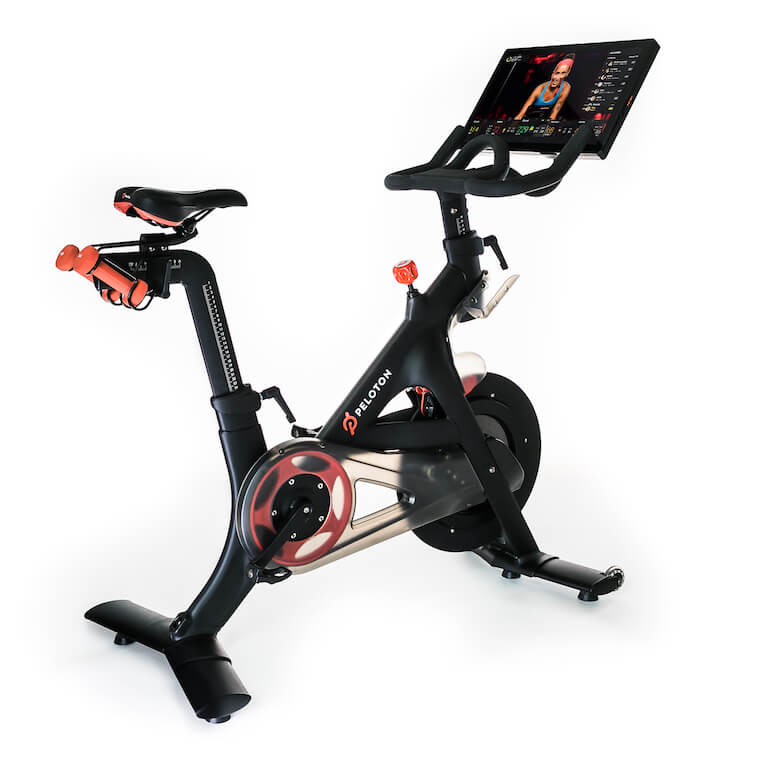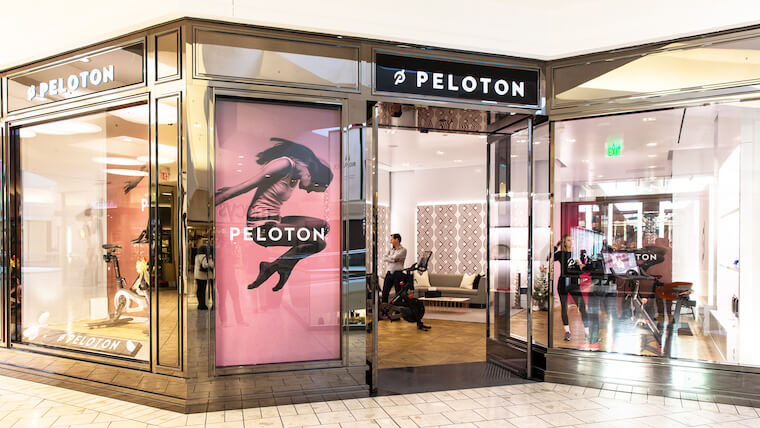How Peloton’s John Foley Cycled Past Rejection to Build a Tech-Savvy, Game-Changing Company
Welcome to Fit for Business, a new column from Well+Good's co-founder and publisher Alexia Brue. Each week, she'll take you behind-the-scenes with the most successful healthy-living entrepreneurs around the world, so you can learn what inspires them, what challenges them, and what it’s like to work in the (booming) wellness space.
This week she's sitting down with John Foley, CEO of the tech-savvy boutique cycling company Peloton.
I first met John Foley in early 2013, when the company consisted of just him and a few engineers working out of a scruffy loft space in New York City's Garment District. They barely had a prototype, but it didn’t take a crystal ball to predict that Peloton was going to be big.
Nearly four years later, the company has raised $120 million, opened showrooms across the country and a studio in New York City, developed a devoted virtual community (which includes Christie Brinkley and Ayesha Curry), and is approaching household-name status. Foley, who’s as passionate a visionary as you’ll ever meet, has surrounded himself with trusted colleagues from his days at media company IAC, and together they’re racing to revolutionize the way people exercise at home.
But as with many start-ups, it hasn't been an entirely smooth ride—here, I speak to the leader of the at-home fitness pack about perservering in the face of "no," the importance of surrounding yourself with a strong team, and more.

Where did your inspiration to start Peloton come from?
My wife Jill and I both work and we have two young children. Like most parents, we have a lot of demands on our time—but we also love trying to work fitness into our everyday lives. We particularly love instructor-led group fitness classes, as they're fun, effective, and efficient. Prior to the Peloton bike, that meant we had to figure out how to reserve a bike in a class at the right time, the right location, and with the right instructor; how to coordinate getting to that class, which often meant getting a babysitter and always included travel time both ways to the studio; and how to pay for that class, something that became economically burdensome as we both wanted to take several classes a week. So the inspiration came from a simple thought: “There has to be a better way!” And there was a better way. The Peloton bike was born.

{{post.sponsorText}}
What differentiates Peloton from everything else out there?
The Peloton bike has effectively created a new category of product. There are bikes that you can buy for your home. With these bikes, you either stare at a wall in your basement or potentially watch TV to distract yourself from the workout. And there are instructor-led indoor cycling classes at studios that are very motivating and compelling, but the logistics—and price—of consistently getting to these studios becomes hard for busy couples, especially couples with children. Peloton merged these two categories. We allow you to take live or on-demand high-energy, instructor-led, group fitness classes from the convenience of your own home, any time you want. There is nothing like it in the world.

Attracting talent is always a challenge. How did you convince people to join Peloton when you were little more than a dream and a few sketches?
You're right, attracting and retaining the world’s best talent is massively important and very hard. At Peloton we've always placed our team and our talent as our number one priority. Interestingly—albeit not surprisingly—start-up technology companies benefit from a self-selection bias where people who like to take risks, who like to take on challenges, who like to solve hard problems, and who approach ambiguity with excitement are the folks who end up at companies like Peloton. I was fortunate enough to know a lot of these people from my days at IAC. In the first few months, I called Tom Cortese, Hisao Kushi, Yony Feng, and Graham Stanton, and each of them were excited to tackle the massive challenges that building Peloton presented. Without these like-minded co-founders and their undying “can do” attitudes, Peloton would never have gotten off the ground.
How did you decide whether to bootstrap the business, seek angel investors, or take VC money?
Oy vey. This is a hard one for me to answer without expletives. Raising money for Peloton was very, very hard. I know you hear this from almost all entrepreneurs, but I do believe that the fundraising process for Peloton would rival any. And because of the capital requirements to build the hardware platforms—both bike and tablet—as well as the physical television-streaming studio, bootstrapping was not an option.
For the first two years, we could not get any institutional investors—venture capitalist or otherwise—to give us money; I pitched approximately 400 institutions and got 400 "no thank-yous." So I moved to pitching thousands of potential angel investors. Scores of pitches every week, for two years. This led to 104 angel investors that represented the first $10 million to get Peloton started.
"Who was building Peloton when I was on the road 70 percent of the first two years? My co-founders, not me"
Finally, a super-smart, visionary young investor named Lee Fixel at Tiger Global saw something that others didn’t. Subsequently, Tiger Global led our Series B. Fast-forward another two years, and hundreds of other institutional pitches—and hundreds of more "noes"— we now have two more fantastic capital partners in True Ventures and L Catterton. They needed little convincing, as they share the vision for what Peloton will become.
And back to the importance of talent and your team…. Who was building Peloton when I was on the road 70 percent of the first two years? My co-founders, not me.

Can you tell us about a key decision you made that was a turning point for Peloton, but that frankly could have gone either way?
Absolutely. There was one turning point in particular that comes to mind. For the first two years, we had 10-12 mostly software engineers in a tiny office building the core Peloton platforms. We didn’t have the money and it didn’t really make sense to hire sales and marketing folks until we had a product to sell.
At first we thought that Kickstarter might be a great place to take a bunch of pre-orders for the bike. But after a somewhat disappointing Kickstarter campaign (we only sold 200 bikes—half to people we knew!), we had to figure out how to sell this product. But again, we didn’t have sales and marketing folks on board and we still didn’t have they money to hire them.
"We often come in to work and push as many pebbles as possible, hoping that momentum will build and we will create an avalanche"
So Tom Cortese and Ryan Engel, two of my most scrappy colleagues, went on a campaign to find a place to launch a pop-up store. They landed on the Short Hills Mall in New Jersey. To be sure, we had no clue as to whether this was a good idea or not. But we spent very little money—about $15,000—building it out and we signed a very short lease (four months) so as not to expose the company and waste money if the store didn’t work. Our light financial model showed that we would be happy if we sold one bike per day—which sounded like a lot to me, so I was not optimistic.
After a few slow weeks, we started selling four to five bikes a day! We were over the moon. We put our hearts and souls into building this product and people liked it! They wanted this new category of product. It was a very important turning point for the company, because the offline retail model worked for us.
What’s the best piece of advice you’ve received?
I think being an entrepreneur in the wellness space is a fantastic place to be. There is massive tailwind for all of us. People across the globe are starting to live healthier lives; the days of smoking cigs, eating Cheetos, and drinking Coca-Cola are over for an increasingly large part of the population.
There are many pieces of advice that have helped us stay focused and push through adversity and challenge at Peloton. Here are few that come to mind:
“Don’t let perfect be the enemy of good.”
This is probably the one we say the most at Peloton.
“The avalanche starts with a pebble.”
We often come in to work and push as many pebbles as possible, hoping that momentum will build and we will create an avalanche. While it sounds a bit trite, things like this will often get in your head and keep you going.
“When you’re going through hell…keep going.”
This is one of my favorites from Churchill. And I needed it at times! When you’re going through hell, you definitely don’t want to stop there, so keep going.
“Sometimes you have to rob a few gas stations on the way to the perfect crime.”
Building businesses from scratch is often not as pretty as you want. It’s hard, and sometimes you have to make decisions that outsiders will question because [these choices are] unusual, confusing, and not perfect. But it’s seldom as clean and straight of a path as you would have liked. Embrace the curves you may have to take, and just keep moving in the general right direction.

A business owner’s to-do list is always long. Please share your favorite efficiency hack.
By far the most efficient hack is to let go. Trust your co-founders and your team. Give them autonomy. Divide and conquer. Slap high-fives in the hall. Don’t sit in the same meeting with anyone who can represent your thoughts. If you truly give everyone full autonomy to do their piece of the puzzle, they will be happier, the business will move faster, and your life will be manageable. But again, you can only do this if you have a team that is smarter and better than you. That’s the key to Peloton’s success to date—our team is world-class and we very efficiently divide and conquer.
Everyone wants to know: Do you have any open positions?
We have tons of open positions! Particularly in software engineering in New York City. But we have jobs around the nation at this point as well. More details here!
Peloton is a perfect example of the booming sweat economy—here's why wellness is such big business right now.
Loading More Posts...